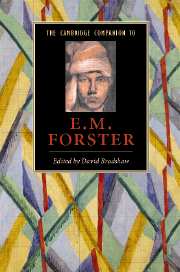Book contents
- Frontmatter
- Introduction
- 1 Forster’s life and life-writing
- 2 Bloomsbury and other values
- 3 Forster and England
- 4 Hellenism and the lure of Italy
- 5 Forster and the short story
- 6 Forster and the novel
- 7 Forsterian sexuality
- 8 Forster and women
- 9 A Room with a View
- 10 Howards End
- 11 Maurice
- 12 A Passage to India
- 13 Forster and modernism
- 14 Forster as literary critic
- 15 Filmed Forster
- 16 Postcolonial Forster
- Further reading
- Index
- Series List
12 - A Passage to India
Published online by Cambridge University Press: 28 September 2007
- Frontmatter
- Introduction
- 1 Forster’s life and life-writing
- 2 Bloomsbury and other values
- 3 Forster and England
- 4 Hellenism and the lure of Italy
- 5 Forster and the short story
- 6 Forster and the novel
- 7 Forsterian sexuality
- 8 Forster and women
- 9 A Room with a View
- 10 Howards End
- 11 Maurice
- 12 A Passage to India
- 13 Forster and modernism
- 14 Forster as literary critic
- 15 Filmed Forster
- 16 Postcolonial Forster
- Further reading
- Index
- Series List
Summary
Introduction
A Passage to India is the most controversial of Forster's novels. The majority of critics regard it as his finest work yet no consensus has emerged about its meanings, partly because the book has proven highly responsive to so many approaches. Despite literary criticism's changing focal points over the decades, from politics and spirituality through to ethnicity and sexuality, it has always kept A Passage to India firmly in its sights because Forster's novel offers fertile ground for the broadest range of analytical and theoretical perspectives. This, in turn, is precisely because of the narrative's simultaneous breadth of reference and radical indeterminacy.
After Howards End, and after producing four novels in six years, Forster appeared to the general reading public to lie largely dormant for fourteen years, until A Passage to India appeared in 1924. Yet, in that time, despite the intervention of the war years, he had published three books: The Celestial Omnibus (1911), Alexandria: A History and a Guide (1922), and Pharos and Pharillon (1923), a book of literary and historical sketches. He had also finished a play, 'The Heart of Bosnia', written Maurice, and begun another novel ('Arctic Summer') which he was never to finish, exploring friendship and the Renaissance ideal of the 'complete' individual. Most importantly for A Passage to India, during these years Forster travelled twice to India. He visited the subcontinent for the first time in October 1912 with R. C. Trevelyan and Goldsworthy Lowes Dickinson. On setting out, Forster conjectured whether his trip might kill off his projected novel and indeed it did contribute to that book's termination. But it led to two other novels, both of which, like the aborted 'Arctic Summer', centred on the subject of friendship.
- Type
- Chapter
- Information
- The Cambridge Companion to E. M. Forster , pp. 188 - 208Publisher: Cambridge University PressPrint publication year: 2007



